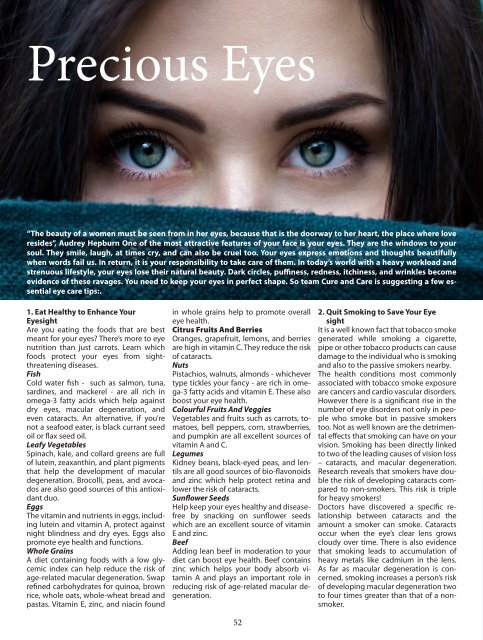You also want an ePaper? Increase the reach of your titles
YUMPU automatically turns print PDFs into web optimized ePapers that Google loves.
Precious Eyes<br />
“The beauty of a women must be seen from in her eyes, because that is the doorway to her heart, the place where love<br />
resides”, Audrey Hepburn One of the most attractive features of your face is your eyes. They are the windows to your<br />
soul. They smile, laugh, at times cry, <strong>and</strong> can also be cruel too. Your eyes express emotions <strong>and</strong> thoughts beautifully<br />
when words fail us. In return, it is your responsibility to take care of them. In today’s world with a heavy workload <strong>and</strong><br />
strenuous lifestyle, your eyes lose their natural beauty. Dark circles, puffiness, redness, itchiness, <strong>and</strong> wrinkles become<br />
evidence of these ravages. You need to keep your eyes in perfect shape. So team <strong>Cure</strong> <strong>and</strong> <strong>Care</strong> is suggesting a few essential<br />
eye care tips:.<br />
1. Eat Healthy to Enhance Your<br />
Eyesight<br />
Are you eating the foods that are best<br />
meant for your eyes? There’s more to eye<br />
nutrition than just carrots. Learn which<br />
foods protect your eyes from sightthreatening<br />
diseases.<br />
Fish<br />
Cold water fish - such as salmon, tuna,<br />
sardines, <strong>and</strong> mackerel - are all rich in<br />
omega-3 fatty acids which help against<br />
dry eyes, macular degeneration, <strong>and</strong><br />
even cataracts. An alternative, if you’re<br />
not a seafood eater, is black currant seed<br />
oil or flax seed oil.<br />
Leafy Vegetables<br />
Spinach, kale, <strong>and</strong> collard greens are full<br />
of lutein, zeaxanthin, <strong>and</strong> plant pigments<br />
that help the development of macular<br />
degeneration. Brocolli, peas, <strong>and</strong> avocados<br />
are also good sources of this antioxidant<br />
duo.<br />
Eggs<br />
The vitamin <strong>and</strong> nutrients in eggs, including<br />
lutein <strong>and</strong> vitamin A, protect against<br />
night blindness <strong>and</strong> dry eyes. Eggs also<br />
promote eye health <strong>and</strong> functions.<br />
Whole Grains<br />
A diet containing foods with a low glycemic<br />
index can help reduce the risk of<br />
age-related macular degeneration. Swap<br />
refined carbohydrates for quinoa, brown<br />
rice, whole oats, whole-wheat bread <strong>and</strong><br />
pastas. Vitamin E, zinc, <strong>and</strong> niacin found<br />
in whole grains help to promote overall<br />
eye health.<br />
Citrus Fruits And Berries<br />
Oranges, grapefruit, lemons, <strong>and</strong> berries<br />
are high in vitamin C. They reduce the risk<br />
of cataracts.<br />
Nuts<br />
Pistachios, walnuts, almonds - whichever<br />
type tickles your fancy - are rich in omega-3<br />
fatty acids <strong>and</strong> vitamin E. These also<br />
boost your eye health.<br />
Colourful Fruits And Veggies<br />
Vegetables <strong>and</strong> fruits such as carrots, tomatoes,<br />
bell peppers, corn, strawberries,<br />
<strong>and</strong> pumpkin are all excellent sources of<br />
vitamin A <strong>and</strong> C.<br />
Legumes<br />
Kidney beans, black-eyed peas, <strong>and</strong> lentils<br />
are all good sources of bio-flavonoids<br />
<strong>and</strong> zinc which help protect retina <strong>and</strong><br />
lower the risk of cataracts.<br />
Sunflower Seeds<br />
Help keep your eyes healthy <strong>and</strong> diseasefree<br />
by snacking on sunflower seeds<br />
which are an excellent source of vitamin<br />
E <strong>and</strong> zinc.<br />
Beef<br />
Adding lean beef in moderation to your<br />
diet can boost eye health. Beef contains<br />
zinc which helps your body absorb vitamin<br />
A <strong>and</strong> plays an important role in<br />
reducing risk of age-related macular degeneration.<br />
52<br />
2. Quit Smoking to Save Your Eye<br />
sight<br />
It is a well known fact that tobacco smoke<br />
generated while smoking a cigarette,<br />
pipe or other tobacco products can cause<br />
damage to the individual who is smoking<br />
<strong>and</strong> also to the passive smokers nearby.<br />
The health conditions most commonly<br />
associated with tobacco smoke exposure<br />
are cancers <strong>and</strong> cardio vascular disorders.<br />
However there is a significant rise in the<br />
number of eye disorders not only in people<br />
who smoke but in passive smokers<br />
too. Not as well known are the detrimental<br />
effects that smoking can have on your<br />
vision. Smoking has been directly linked<br />
to two of the leading causes of vision loss<br />
– cataracts, <strong>and</strong> macular degeneration.<br />
Research reveals that smokers have double<br />
the risk of developing cataracts compared<br />
to non-smokers. This risk is triple<br />
for heavy smokers!<br />
Doctors have discovered a specific relationship<br />
between cataracts <strong>and</strong> the<br />
amount a smoker can smoke. Cataracts<br />
occur when the eye’s clear lens grows<br />
cloudy over time. There is also evidence<br />
that smoking leads to accumulation of<br />
heavy metals like cadmium in the lens.<br />
As far as macular degeneration is concerned,<br />
smoking increases a person’s risk<br />
of developing macular degeneration two<br />
to four times greater than that of a nonsmoker.


